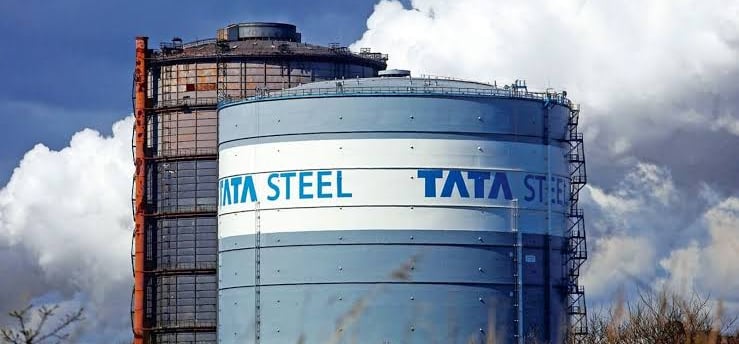Add your promotional text...
Tata Steel Secures £500 Million U.K. Government Grant to Revolutionize Green Steel Production
Synopsis: Tata Steel has received a £500 million grant from the U.K. government for its groundbreaking green steel project at Port Talbot. The initiative, part of a £1.25 billion investment, will install an electric arc furnace, reducing emissions by 90% at the site and cutting U.K. industrial carbon emissions by 8%. The project not only preserves 5,000 jobs but also positions Tata Steel as a leader in sustainable steel production, supporting the U.K.'s transition to a low-carbon economy.
TOP STORIES
By Vishwash Saxena
9/12/20244 min read


Tata Steel’s stock witnessed a significant surge on Thursday after securing a £500 million (₹5,474 crore) grant from the U.K. government. The funding is intended for the company’s innovative green steel project at Port Talbot, a groundbreaking initiative that promises to reshape the steel production landscape in the U.K.
What Led to the Surge?
The grant is part of a larger £1.25 billion (₹13,688 crore) investment plan aimed at revolutionizing steel production at Tata Steel’s Port Talbot Steelworks in Wales. The U.K. government’s contribution is complemented by a further £750 million (₹8,213 crore) investment from Tata Steel itself. This combination of public and private funding underscores the importance of the project, which is seen as the most substantial capital infusion into the U.K. steel industry in decades.
At the heart of the initiative is the installation of a cutting-edge electric arc furnace, a technology that will enhance the efficiency and sustainability of steel manufacturing. By transitioning to electric arc furnace-based production, Tata Steel is poised to significantly reduce the environmental footprint of its operations in the U.K.
Transforming U.K. Steel Production
The introduction of the electric arc furnace at Port Talbot marks a pivotal shift for Tata Steel and the wider U.K. steel industry. This project is not only a financial boost but also a crucial step in securing the future of steel production in the U.K. The Port Talbot facility has been a cornerstone of British steel manufacturing for decades, and this investment ensures its viability for the long term.
One of the key benefits of this project is the preservation of approximately 5,000 jobs, a major win for the local economy in Wales and the broader U.K. The preservation of these jobs is crucial for the stability of the region, as the steel industry remains a vital source of employment and economic activity.
A Boost for the U.K.’s Green Agenda
In addition to its economic importance, Tata Steel’s green steel project is poised to have a profound impact on the environment. The installation of the new electric arc furnace is expected to reduce the U.K.’s industrial carbon emissions by a staggering 8%. At the Port Talbot site itself, emissions are projected to drop by 90%, a remarkable achievement that aligns with the U.K. government’s broader efforts to transition to cleaner and more sustainable industrial practices.
The steel Industry is one of the largest sources of carbon emissions globally, and initiatives like Tata Steel’s green steel project are crucial in driving the shift toward a low-carbon economy. The environmental benefits of the project extend beyond Port Talbot, contributing significantly to the U.K.’s goals of reducing greenhouse gas emissions and combating climate change.
Market Reaction and Analyst Perspectives
Unsurprisingly, the announcement of the grant and the subsequent progress on the green steel project had a positive impact on Tata Steel’s stock. Shares of the company rose by 2.79%, reaching ₹152.30 in Thursday morning trading. The market’s reaction reflects optimism about Tata Steel’s future prospects, both in terms of its financial performance and its leadership in sustainable steel production.
Global brokerage firm Morgan Stanley also weighed in on the development, offering a cautiously optimistic outlook on Tata Steel. While maintaining an “underweight” rating on the stock with a target price of ₹135, the firm acknowledged that the funding agreement is a positive step forward. Morgan Stanley noted that while details on additional financial support for employees remain unclear, the absence of any unexpected project costs is a welcome development.
The brokerage firm’s analysis highlights the importance of clarity around the project’s full scope, particularly with regard to employee benefits and potential future government support. Nevertheless, the overall sentiment remains positive, with the project seen as a crucial milestone for both Tata Steel and the U.K. steel industry.
The Broader Implications for U.K. Industry
Tata Steel’s green steel initiative at Port Talbot is more than just a corporate project; it represents a critical investment in the future of the U.K.’s industrial base. The shift toward electric arc furnace technology is a key part of the U.K. government’s broader strategy to decarbonize heavy industry, reduce reliance on traditional blast furnaces, and transition to greener methods of production.
The project's successful implementation could serve as a model for other industries in the U.K. looking to reduce their carbon footprint while maintaining competitiveness on the global stage. With the U.K. government providing substantial financial backing, Tata Steel’s green steel project could catalyze further investments in sustainable industrial practices across the country.
In conclusion, Tata Steel’s landmark green steel project at Port Talbot is a defining moment for the U.K. steel industry and the company’s future. The £500 million government grant, coupled with Tata Steel’s own significant investment, sets the stage for a transformation that will have far-reaching economic and environmental impacts. By preserving thousands of jobs and reducing carbon emissions on an unprecedented scale, Tata Steel is not only safeguarding its own future but also contributing to the U.K.’s transition to a greener, more sustainable industrial landscape.
The project is still in its early stages, and there are some uncertainties surrounding additional financial support and long-term implementation. However, the groundwork has been laid for a bright future for both Tata Steel and the U.K. steel sector. Investors, industry stakeholders, and environmental advocates alike will be watching closely as Tata Steel leads the way in the next generation of steel production.
